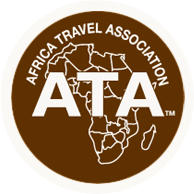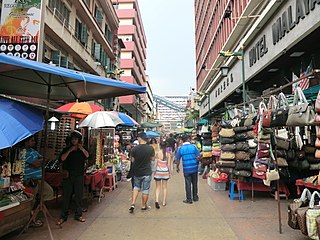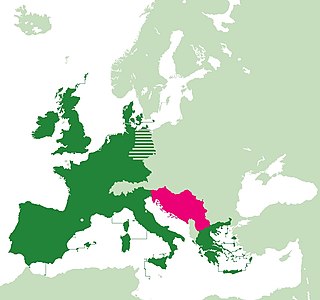
Tourism is travel for pleasure, and the commercial activity of providing and supporting such travel. UN Tourism defines tourism more generally, in terms which go "beyond the common perception of tourism as being limited to holiday activity only", as people "travelling to and staying in places outside their usual environment for not more than one consecutive year for leisure and not less than 24 hours, business and other purposes". Tourism can be domestic or international, and international tourism has both incoming and outgoing implications on a country's balance of payments.

A tourist attraction is a place of interest that tourists visit, typically for its inherent or an exhibited natural or cultural value, historical significance, natural or built beauty, offering leisure and amusement.

Tourism in Australia is an important part of the Australian economy, and comprises domestic and international visitors. Australia is the fortieth most visited country in the world according to the World Tourism Organization. In the financial year 2018/19, tourism was Australia's fourth-largest export and over the previous decade was growing faster than national GDP growth. At the time it represented 3.1% of Australia's GDP contributing A$60.8 billion to the national economy.

Cultural tourism is a type of tourism in which the visitor's essential motivation is to learn, discover, experience and consume the cultural attractions and products offered by a tourist destination. These attractions and products relate to the intellectual, spiritual, and emotional features of a society that encompasses arts and architecture, historical and cultural heritage, culinary heritage, literature, music, creative industries as well as the living cultures with their lifestyles, value systems, beliefs and traditions.

LGBTQ tourism is a form of tourism marketed to gay, lesbian, bisexual, transgender and queer (LGBTQ) people. People might be open about their sexual orientation and gender identity at times, but less so in areas known for violence against LGBTQ people.
Incredible India is the name of an international tourism campaign launched by the Government of India in 2002 to promote tourism in India. The "Incredible India" title was officially branded and promoted since 2002. The exclamation mark forms the 'I' of India. The exclamation used creatively across several visuals complements the concept behind the word "Incredible".
Business tourism or business travel is a more limited and focused subset of regular tourism. During business tourism (traveling), individuals are still working and being paid, but are doing so away from both their workplace and home.

Tourism in Cyprus occupies a dominant position in the country's economy, and has significantly impacted its culture and multicultural development throughout the years. In 2006, the tourism industry made up 10.7% of the country's GDP and the total employment in the tourism industry was estimated at 113,000 jobs. With a usual minimum of around 4 million tourist arrivals per year, it is the 40th most popular destination in the world and the 6th most popular per capita of local population. Cyprus has been a full member of the World Tourism Organization since 1975.

The Pacific Asia Travel Association (PATA) is a membership association working to promote the responsible development of travel and tourism in the Asia Pacific region.
The Oklahoma Department of Tourism and Recreation is a department of the government of Oklahoma within the Tourism and Branding Cabinet. The Department is responsible for regulating Oklahoma's tourism industry and for promoting Oklahoma as a tourist destination. It is the Department which established regional designations for the various parts of the state which are in common use today: Red Carpet Country, Green Country (Northeast), Frontier Country (Central), Choctaw Country (Southeast), Chickasaw Country, and Great Plains Country (Southwest).
The World Travel Monitor (WTM) / European Travel Monitor (ETM) is a worldwide tourism information system detailing the foreign (outbound) travel behaviour practiced by a country’s respective resident population.
The International Inbound Travel Association, formerly known as the Receptive Services Association of America, is a 501(c)6 trade association of major North American–based receptive tour operator companies and suppliers. Based in Lexington, Kentucky, IITA is the only association focused solely on international inbound travel to the United States.

The American Bus Association (ABA) serves as a trade association for motorcoach operators and tour companies operating in the United States and Canada. With its headquarters situated in Washington, D.C., the association has a membership comprising approximately 1,000 companies engaged in bus operations or bus-based tours, alongside around 2,800 organizations representing the broader travel and tourism industry. Additionally, several hundred suppliers of buses and related products and services are affiliated with the ABA.

Africa Travel Association (ATA) is a non-profit international travel industry trade association established in 1975.
The Seychelles Tourism Board (STB), a public/private sector body headed by CEO Mrs. Sherin Francis, with Mrs. Kathleen Mason as Chairperson, oversees most aspects of Seychelles' tourism industry whose Minister is Mr. Didier Dogley. The Seychelles Tourism Board is responsible for the promotion and marketing of the Seychelles islands as the preferred tourist destination.
Welcome Chinese is a hospitality standard, brand and company founded in 2013 and headquartered in China. It was developed by the marketing and communications firm Select Holding Ltd, together with the China Tourism Academy (CTA), board of the China National Tourism Administration (CNTA). Company's purpose is to help Chinese tourists to feel more comfortable, travel easier and feel welcome overseas. Another goal is to help global hotels/resorts, museums, amusement parks, transportation hubs and all other sightseeing and tourist destinations to reach China's market through promotional activities.

Fashion tourism is a niche market segment evolved out of three major sectors: Creative Tourism, Cultural Tourism and Shopping Tourism. Fashion Tourism can be defined as “the interaction between Destination Marketing Organizations (DMOs), trade associations, tourism suppliers and host communities, with people travelling to and visiting a particular place for business or leisure to enjoy, experiment, discover, study, trade, communicate about and consume fashion.”
Thessaloniki Convention & Visitors Bureau—known as TCVB —was the first such bureau that operated in Greece. It was founded by the Thessaloniki Hotel Association (THA) in 2000, operated as a non‑profit organization and was active until 2009. The main goal of TCVB was to establish the city of Thessaloniki as an internationally recognized conference city and a popular destination for incentive travel.

From the establishment of the European Economic Community in 1957 until the breakup of Yugoslavia in the early 1990s, thus during the Cold War period, the Socialist Federal Republic of Yugoslavia was the first socialist state to develop relations with the organisation. Notwithstanding occasional and informal proposals coming from both sides, Yugoslavia never became a full member state of the EEC.

Mariana Oleskiv is a Ukrainian high-ranking official who has been working in the field of tourism and MICE since 2002.














